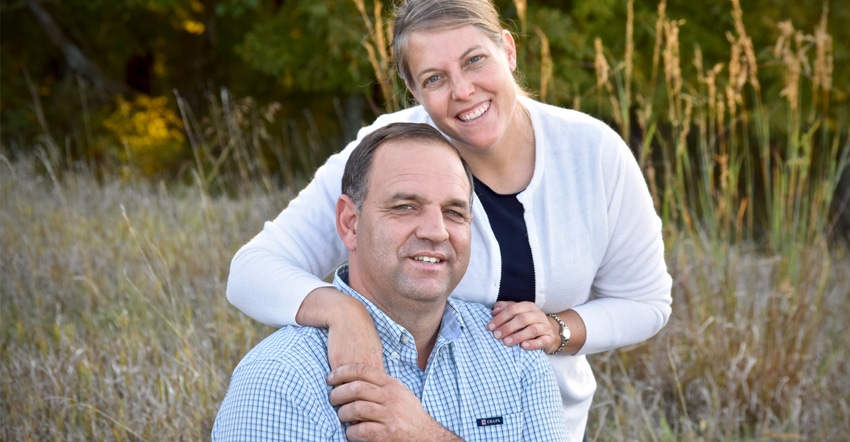July 19, 2022

Change is the defining word at the Double G&L Farms, owned by Wayne and Carrie Grimm.
One of six couples named to the 2021 Class of Kansas Master Farmers and Master Farm Homemakers, they actively involve their five young daughters in their farming operation near Morrill, Kan., in Brown County. Besides their extensive cattle and crop operation, the family’s enterprising spirit is evident in a host of other ventures.
Family affair
Both Wayne and Carrie grew up on a farm, participating in 4-H and FFA. That early, active involvement in agriculture is what fueled their desire to return to their roots.
After marriage, they bought into the Grimm family farm, partnering with Wayne’s dad and brother. In 2019, Wayne, Carrie and their daughters started farming on their own. “Production and financial management decisions are made by a team which consists of the whole family,” Wayne says.
Elsie, their oldest, is the cow herd manager and farm accountant. Sadie, who graduated from high school in 2021, is the farm’s marketing manager; she runs farm equipment, helps with the cattle and oversees the family website. Ninth-grader Emmie is the videographer and editor of the farm’s YouTube channel that now includes nearly 4,000 followers. Estie, 10, and Nellie, 7, join their sisters in running their own small herd of 20 show-club cows, as well as helping with other family enterprises. An on-site farm store is their latest venture; it features the fruits of their labors — goat’s milk soap, lotion, candles and car fresheners, farm and livestock paintings, and baked goods.
A further nod to the girls’ enterprising spirit is evident in the Grimm Girls Farm sign that hangs on the building that houses their dog grooming and licensed dog breeding businesses.
It doesn’t stop there, though. Most recently, the family bought a food trailer that is called the Grimm Girls Chuckwagon.
“My parents were willing to support and help us. Now we want to do the same for our girls,” Wayne says.
Agriculture education
There’s always something going on at the Grimm farm, and education is at the top of the list. As agriculture advocates, they organize and present a biennial Farm Safety Day for first- and second-graders, their teachers and parents in local and neighboring communities. Topics range from ATV, livestock and tractor safety to how to call 911.
Many early elementary school-aged children take advantage of free farm tours.
“They have the opportunity to milk a goat, bottle-feed calves, collect eggs, learn the purposes of sheep and their wool, get up in a tractor and learn the process wheat goes through to become flour for bread,” Carrie says.
People from Spain, Hungary, Belgium, Mexico, Canada, and all over the United States have toured the farm. It was a stopping point during the 2021 Big Kansas Road Trip.
Farm and ranch operation
Originally, the Grimms bred and fed Holstein heifers for a big dairy in Indiana, but eventually, Wayne and Carrie moved from dairy to beef cattle production. Running a calving-to-finish operation, they fatten 800 calves a year, calve 550 in the spring and 100 in the fall, and buy a few cattle to finish out the pens. A goal for the future is for the Grimms to tag cows with electronic ID tags, allowing them to better track productivity data.
The cattle are Beef Quality Assurance-certified and non-hormone-treated. They graze on cropland after harvest and are fed farm-produced grain.
“We buy only wet cake, a wet distillers grain and a byproduct of corn from ethanol plants,” Wayne says.
They farm 1,100 tillable acres and 2,000 grass acres using no-till methods on all acres, except where manure is used to fertilize the soil; minimal tillage is used on those acres. As soon as cornfields have been cleared, oats, rye and turnips are drilled. These cover crops enhance the soil, limit soil erosion, provide nutritious grazing for cattle during fall and winter, and provide excellent spring feed. Other crops include soybeans, wheat, alfalfa, brome and sudangrass.
Relying on new technology and approved methods, the Grimms use pivot irrigation on 40% of their crops. A filter strip system is used for manure management. Composting of dead livestock follows Kansas Department of Health and Environment standards. GPS technology allows the family to better manage variable rate fertilizer and seed distribution. A residential wind generator is used to help conserve energy.
Through all of their enterprises, and their various farming ventures, Wayne and Carrie’s love of agriculture and farming continues to shine. It’s important to them to keep striving to preserve the land as they add new technologies and enterprises. In the process, they continually bridge the gap between the producer and consumer, and let people know what it takes to get food on the table and better understand the origins of the food they eat.
Family motto
The Grimm Girls website, grimmgirlsfarm.com shares links to their YouTube videos that aim to educate the public about farming and livestock production. The family feels they have an obligation to share their farm’s story with the non-farming public, citing this Bible verse on their website, 1 Peter 4:10: “As every man hath received the gift, even so minister the same one to another, as good stewards of the manifold grace of God.”
Family lore
Wayne and Carrie share a birthday. On the same day, 47 years ago, at two different hospitals — she at Sabetha (Kan.) Hospital and he at the hospital in Hiawatha, Kan. — the two took their first breaths. “He is 37 minutes older than I am,” Carrie says. The two would grow up and both attend Sabetha High School, participating in FFA, and livestock judging in particular.
Newell West lives in Abilene, Kan., but grew up on a farm in Stafford County, Kan. A career educator, she taught home economics and family and consumer sciences at the secondary and adult levels. She continues to pursue educational endeavors as a freelance writer.
You May Also Like




